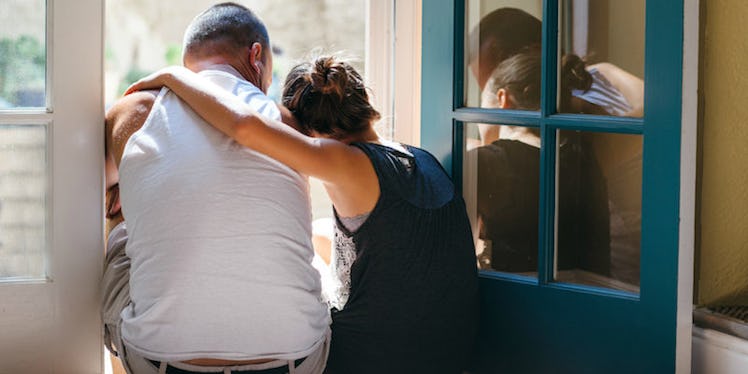
How Confronting My Absent Dad Helped Me Get Over My Fear Of Commitment
Unlike the people who know how they've been impacted by being raised in an unemotional environment, growing up in my closed off, West-African family — with my strict, straight-faced, no-hugs father — wasn't so horrible.
I didn't know the difference between strictness and a straight face.
My mom tried a little, but a father plays a very special role in a girl's life.
I didn't know this before, but it didn't matter.
My parents are very loving people, and they did the best they could to provide for us. But that was all they did: provide.
It was really all my siblings and I could ask of them. There was no closeness, though.
Even when my parents split up, nobody talked to us about it.
They dumped a 30-year marriage in the trash and went their separate ways.
But nobody told us what happened or why they thought it was best to walk away from their marriage.
We didn't ask because it wasn't our business.
That's how my family was. You don't ask anything that isn't your business.
That was how everything got swept under the rug. Nothing was ever talked about.
Every issue was ignored, buried deeper and allowed to fester until it came bubbling out like a volcanic eruption.
So when they decided their marriage was over, none of us asked what went wrong.
Many things went wrong, but they just never talked about it.
I didn't think it was a big deal that I only saw my dad once a year.
I thought it didn't matter I couldn't remember the last time I had hugged him or the last time he had hugged me.
I thought it wasn't important that my mom didn't know whether or not I was dating anyone, or whether or not I had ever dated anyone in my life.
She never asked, so I never told her. I thought this was normal.
After all, it's how I had been raised. There was no need to talk or express my feelings. Everything was okay.
Only it wasn't.
I didn't realize how that lack of connection had made me a closed-off, unemotional person.
I didn't realize the reason I hated displays of emotion was because I was never shown any. I just thought they made people look weak.
I didn't know I was such a commitment-phobe because I thought letting people into your life only means they get to walk out and leave.
I didn't know a lack of emotional availability had shaped me into a sad, depressed person who didn't even know why she was sad and depressed.
That is, until I read "How Dads Affect Their Daughters Into Adulthood" by Linda Neilson.
That was when I knew it wasn't normal that when I was faced with the prospect of being in a relationship, my first thoughts were of rejection and abandonment.
I knew it wasn't normal that I was basically allergic to human connection.
It wasn't just my introverted nature that made it so difficult to communicate my feelings. I was sick and tired of being angry and detached.
So, I went and spent some time with my dad (and his new wife).
I wanted to talk.
Even if it was the last thing I did, I wanted to talk.
I was done with fighting the anxiety and depression on my own. I was done curling up in a ball of tears whenever I saw other families and how close they were.
I knew it wasn't normal.
So, I went to him and demanded a talk.
Then, I realized my dad was a different person from when I was growing up. He was more open, expressive and jovial.
He was generous, sweet and kind.
He finally talked to me about the divorce. I told him about all the anger and frustration I felt because I found it hard to connect with people.
He told me it was not my fault. He said he wished he'd been a better father.
He wished he'd listened more, talked more, laughed more and hugged more.
He wished he'd done all of that in my childhood because he realized that could've made me a happier person.
He said it was, however, not too late to mend those fences.
Most of all, he encouraged me to open up and talk about my feelings with him.
He listened. He wasn't just trying to make up for those cold years; he was actually interested in what was going on in my life.
He wanted to know all of it.
First, I cried. Then, we talked.
We joked, laughed, hugged and prayed.
We learned more about each other in those brief moments than we had in all the years we'd been in each other's lives.
It was, by far, the most rewarding day of my life.
I didn't need to spend a lot of money and a lot of hours in therapy.
I didn't have to carry around that burden for years and wind up on a therapist's couch in my 40s, crying about my cold, distant father and awful childhood.
All I needed was a better relationship with my father.
I'm a better person for it.
Whether we realize it or not, having an open relationship with our parents is a vital thing. It shapes the people we turn out to be.
If there's a chance you can have a closer relationship with your parents, it's in your best interest to take that chance.
You'll be glad if you do.